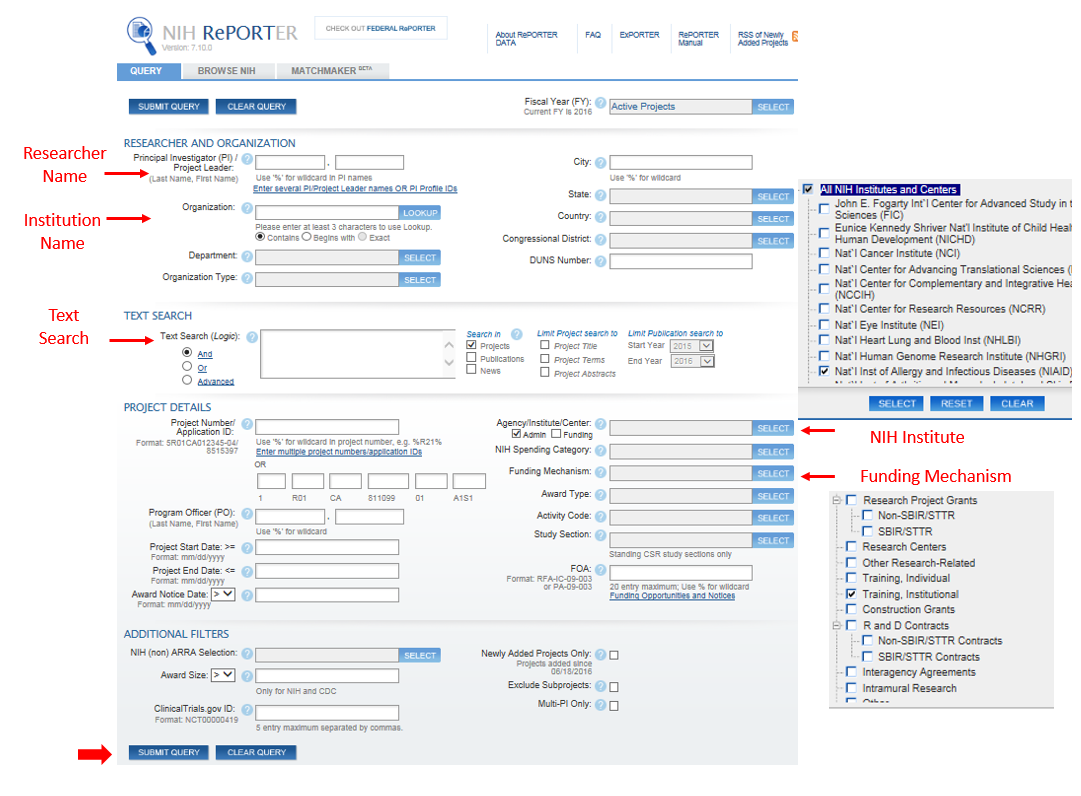
Important skills needed to navigate a science career include knowing where to look for research opportunities, finding financial support for your training and research, learning how to map your career steps and transitions, and identifying resources to build professional skills. NIH, educational institutions, faculty, students and professional societies provide resources and support programs designed to enhance diversity in the biomedical research workforce. Professional groups geared toward an individual’s cultural identity or academic discipline provide opportunities for networking among scholars and are often used as recruiting sources for institutions and programs. On this page, we provide tips on how to find research opportunities.
NIH RePORTer is a good starting point to find NIH funded research opportunities at your institution or another location. There are lots of ways to use the site. Download a PDF version.

-
Search for NIH-funded investigators at an institution (for example, find who is conducting research, and what they are studying to identify an investigator who might support you on a diversity supplement):
Step 1: Enter the institution name (or unique word and RePORTER will provide the rest) under “Organization” and click “Lookup”
Example: You want to know about researchers at Indiana University. Enter “Indiana” and 35 organizations appear in left side box; scroll and select a particular institution (e.g. Indiana University, Bloomington, IN) and the name will fill the “organization” box.
Step 2: Click “Submit Query” at bottom of page
This search example resulted in 123 entries, displayed alphabetically by project leader (see partial results, below). Scan the project titles and leaders. Click on the title and read the abstract. Consider visiting the institutional web pages of the project leader to learn more about the lab, and contact the PI to discuss potential research opportunities.

-
Search for all the institutions that have an NIH training program in a particular field (for example, schools with a training program in infectious disease).
Step 1: Select “training, institutional” under “funding mechanism.” This very general search results in over 2000 institutional training programs.
Step 2: Add the selection of an NIH institute in Agency/Institute/Center (see acronym list http://grants.nih.gov/grants/acronym_list.htm; note that this two letter code appears before the project number). This search example results in ~180 NIAID institutional training programs around the nation in allergy and infectious disease areas and listed alphabetically by project leader (partial results, below).

-
Search for a program, using text words.
Step 1: Enter text (note that search for text words occurs in Projects by default)
Example 1: A search using the term “post baccalaureate” results in ~90 programs;
Example 2: A search using the term “summer research” results in ~800 programs; “summer research veterinary” results in 32 programs
-
Explore RePORTER: More Searches
- Search for others at your own institution with a fellowship or career development award that you are considering. Perhaps they will share their tips for preparation.
- Identify researchers and projects you want to learn more about before your graduate program interview.
- Choose institutions that have experience with career development awards.
NIH supports institutions with grant awards for pre- and postdoctoral training, called institutional training grants (such as NRSA T32) and institutional career development grants (such as K12 and KL2). Search for institutions with these programs near you by using NIH RePORTer, and contact the project leader for more information. Other institutional programs that offer summer research, year-long research and can be explored the same way.
In addition, if you identify an NIH-funded researcher with a project that interests you, that researcher may request a Diversity Supplement to support your participation in that research team. This flexible administrative supplement is designed to support research engagement at a wide variety of career stages, on many types of research grant types.
Search for more federally-sponsored opportunities in STEM:
Many professional societies and affinity groups also offer research opportunities. View a partial list of these groups below. Another search strategy might be to look up “diversity fellowship” or “diversity summer research.”
NIH provides predoctoral fellowships to support individual research doctorate and dual-degree training (F31 and F30), postdoctoral fellowships (F32), as well as Career Development Awards (various K01, K08, K23, and K99-R00 awards, for example). Several of these are diversity-related. See the NIH Research Training and Career Development site for details. You will need to work with your research mentor and others at your institution to submit the final proposal. To learn more about how your proposal is reviewed, you can visit this site for applicants from the Center for Scientific Review.
Consider the NIH Loan Repayment Programs (LRPs) that offer support for both extramural and intramural researchers.
In addition to NIH programs, other agencies and many professional organizations and affinity groups offer funding opportunities and seek to enhance diversity in science by supporting fellowships, travel awards, or even research grants to faculty. A partial list includes:
Some NIH funding opportunities are directed toward building research at under-resourced institutions. Learn more about research funding opportunities available:
- IDeA Networks of Biomedical Research Excellence (INBRE)
- Centers of Biomedical Research Excellence (COBRE) programs available only in Institutional Development Award (IDeA) eligible states
- Support of Competitive Research (SCORE) programs:
- Faculty research at under-resourced institutions that expose students to research can be supported by Academic Research Enhancement Award (Area) R15 programs
Professional organizations and affinity groups may also offer individual funding opportunities. A partial list includes:





